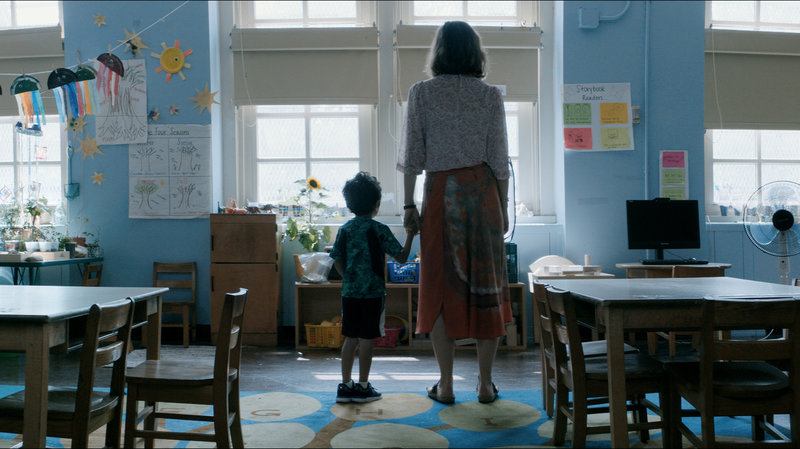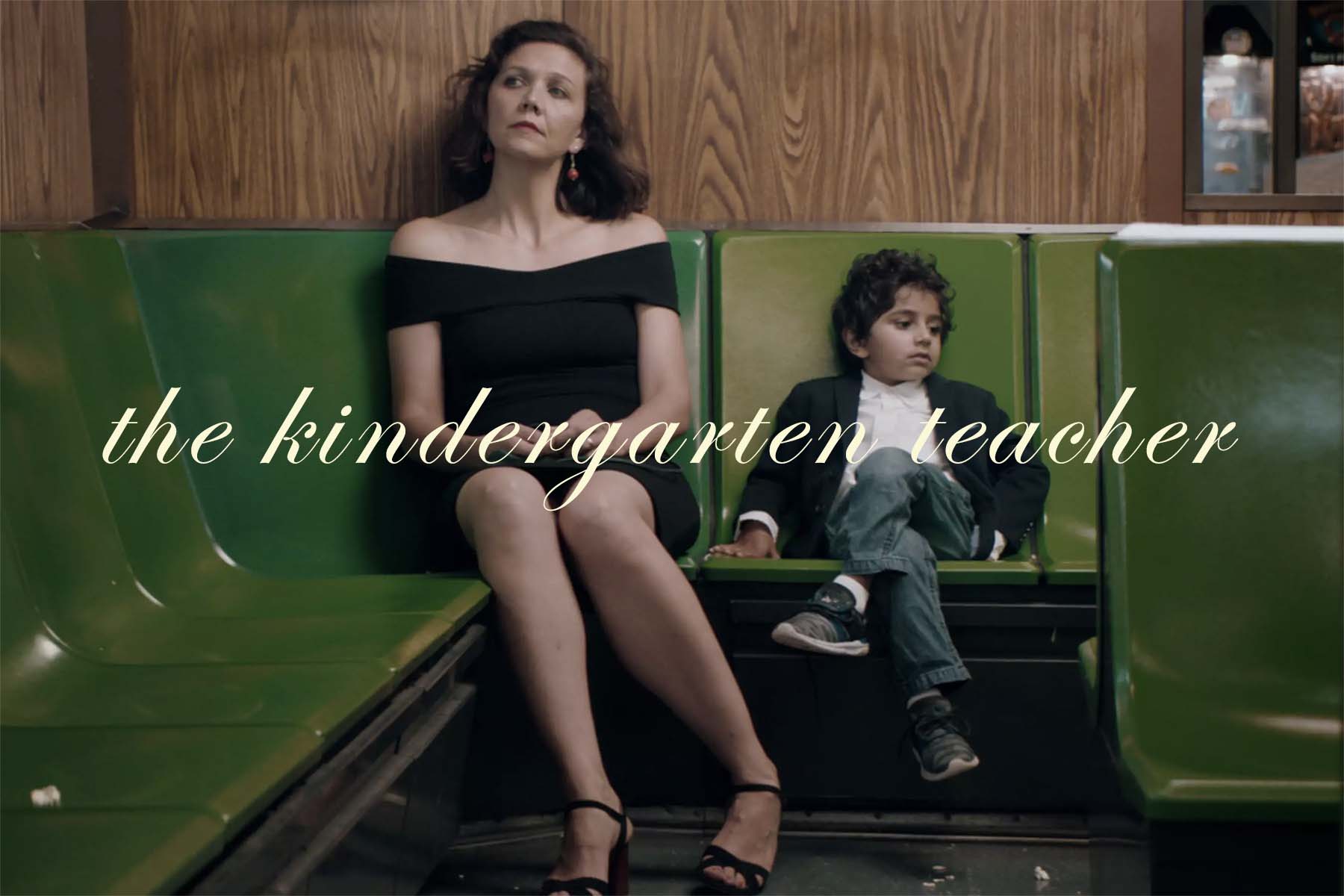You can watch The Kindergarten Teacher at these online streaming locations:
Sometimes you are handed a movie… and you are CERTAIN you are going to hate it. In this category I would place, without malice aforethought, any and all movies with the title of “The Kindergarten Teacher”. I mean, it goes without saying. Right? AWFUL. But five minutes into this particular Kindergarten Teacher I realized that that might just not be the case.
If you’d just take my word for it for once – you can watch the film right here. If that isn’t enough for you, watch this trailer. And then know, just know right now, that I like you just a little bit less than I did one sentence ago. Fair? Great.
Let’s dive in shall we? Please batten down the hatches and take us to ludicrous speed… cause I’ve been dying to talk about this movie since I watched it on a plane yesterday. All I’ve been thinking about really. So excited.
The Kindergarten Teacher Movie Deep Dive
I really don’t want to do a full fledged walk through on this movie. It’s simple enough to understand. But its complicated to unpack. So, with that in mind I am going to just give you the TV Guide version of the walk through, and then get on with it.
So Lisa Spinelli (played by the ever amazing Maggie Gyllenhaal, of one of the best movies ever – Donnie Darko) is a frustrated and drifting Kindergarten Teacher. She believes that we, as a culture, are a hollow husk and that we don’t know how to appreciate the truly great things in life. Her children, her husband? They are lost to the banal things of this life, and are missing the greater beauties available to us. Lost in “smart” phones, interwebs, and television. And heck, I don’t disagree with her, not even a little. And so she signs up for a poetry class, in the hopes of figuring out how to kindle exceptionality into her life again.
Problem? She’s a terrible poet.
But then a boy in her class, Jimmy Roy (played by Parker Sevak, which is his break out role) begins randomly reciting the most amazing poetry she’s ever heard in her life. And her poetry class agrees! But when the boy’s family begins to take issue with the obsessiveness of Mrs. Spinelli’s interest, and licenses she takes with the boy, things blow up horribly. And when Jimmy’s father pulls Jimmy out of the school after Lisa took Jimmy to a poetry reading thing late one night… well, Lisa abducts Jimmy from his new school and makes a run for the border with him.
And when I recap the movie for you in that sort of crass, un-nuanced way, Lisa comes off as a complete and total nut job. But is she? Really? The answer my friends hangs in the balance of the movie’s final four words. But we’ll get there in good time.

The Kindergarten Teacher Movie Explained
For most of the movie, we don’t get a lot of exposition explaining why exactly Lisa is doing the things she’s doing. There really is no narration to indicate where Lisa is coming from. There are no big signs in the sky with arrows pointing to things she finds unconscionable. And so, if you watched this movie, and just came away with – whoa, what a MENTAL CASE! Lock her up! You missed like 80% of what this movie was trying to dialog about. Here, this is an interview with Maggie Gyllenhaal and Sara Colangelo (the writer and director) – and if I set it up right, it should start at the 2:00 minute mark.
Basically the thing she is talking about here is that audience she watched the movie with, they saw the scene in the poetry club and guffawed at Lisa. And then the next minute, Lisa was sobbing in the bathroom with this five year old by her side.
So let me see if I understand what really happened here. Maggie played this role of Lisa, and she played her with a skewing, a bent, that believed that Lisa was true to her convictions. That she was well intentioned. That she was all in on these particular convictions. But when Maggie, the actor, watched this portrayal of Lisa, in a theater full of other viewers, and when she watched them respond with outrageous laughter, she was shocked. (Can I say that personally, when I saw this moment she is describing here, it literally took my breath away and broke my heart.) But Maggie? She says that we can’t laugh at her. That isn’t possible. Because we just can’t know what her motivations are and what brought her to this point, and this conclusion. But that is the kind of world we live in right now. We guffaw at people as a matter of course. Sure, she had just abducted a child to go to this event. And yes, she’ll even do worse later in the movie. But in terms of crimes that we advocate for in our other movie viewing experiences, we would do well to skew Lisa’s direction as opposed towards say, any of Quentin Tarantino’s protagonists’ direction.
But maybe I’ve gotten ahead of myself here. Maybe you don’t even understand Lisa at all. Maybe we should talk through her perspective a bit.
The Lisa Spinelli School of Thought
We don’t have a ton to go on, but what we do have is about as concrete an example we could ever have wished for. At one moment in the film, Lisa is explaining to Jimmy’s father that in ages past, when someone with stellar talent was found, they were heralded as a near god-like entity. Wunderkinds were celebrated and exalted in order to better all of humanity. Young artists, musicians, architects, poets, writers, would be snatched from obscurity and given absolute anything they desired in order to cultivate their talent. Sure, they would break every single child labor law we have today in their pursuit of this talent, but they’d be pampered all along the way.
This sound a bit barbaric today. But it was assumed to be normal yesterday. And the example Lisa gives is Mozart:
Even at the age of four, Wolfgang Amadeus Mozart apparently absorbed everything to do with music with a tremendous appetite and seemingly without effort. Not only did he already know how to play his first instruments, the piano and the violin, but he now composed his first piano concerto. Leopold Mozart regarded the blots of ink put down on paper by the unskilled hand of a child with disbelief, realizing that all notes were correctly arranged following contemporary musical rules. From this time on he also taught his son the art of composing: Wolfgang played the melodies on the piano and his father put the notes down on paper. Thus dances for keyboard came into being. At the age of six Wolfgang Amadeus Mozart composed a minuet and a trio for keyboard, the future number 1 of the Köchel catalogue.
http://www.mozart.com/en/timeline/life/childhood-and-musical-education-child-prodigy/
Curious what a child of six could be capable of that would send the music world into a literal dither? Here’s what Mozart’s first composition sounded like:
I mean. Come on. Six? Of course we would nurture that kind of talent today in the hopes of making it blossom. Wouldn’t we? Well, no. No, we don’t. And that is the thing that has Lisa in a serious twist. She is unwavering in her belief that supporting Jimmy, no matter what, is 100% the right thing to do. She believed this so much that she abandoned her lost and flailing children and husband, and sacrificed her life towards this goal. She ran counter to the course and unfeeling belief of society that we do things in a certain way. And if you don’t do them that way, you are a child molester.
Cause, let’s be honest here, that is how this will get played out after the fact. The tabloids will pick this story up, and brand her as a rapist, or worse. Right? But she was anything but. She was 100% motherly to this child. She even told him how to dial 911 for heaven’s sake!
Lisa’s Perspective On Her Failed Life
One of the really deep under currents of this movie is that Lisa believes herself a failure. But it is a relatively recent discovery. Apparently Lisa (per her daughter) had only recently joined the poetry class, in something of a minor mid-life crises moment. And though excited about poetry, she’s seen as quite the failure in the class. Well, that is until she started using Jimmy’s poetry as her own. And suddenly? She’s heralded as a success.
But as we look through her family life, and the relationships she has with her children and her husband, we see that her dreams as a kid have all died. Her children have stopped talking to her as they burrow deeper and deeper into a culture that is chasing the banal. There is no better example of this than Lisa’s daughter. She gets straight A’s. By all measures, Lisa should be ecstatic about her daughter’s scholastic achievement and abilities. There is though, an enormous divide between the right leading edge of the bell curve, and off the charts entirely. And Jimmy, he’s off the charts completely.

Our Fear of the Divine
This past weekend in Memphis and Atlanta, I happened to have an opportunity to attend a mind blowing poetry reading event. It was amazing. I stood from the back and watched with tears streaming down my face perpetually… like, not stopping. The intensity of passion and the brilliance of the stanzas just lit my soul on fire. And after watching the show start to finish three different times I was a mess. Just a pool of jello. Each word was a rocket launched across the sky. There were so many soaring ideas I couldn’t rationalize what I was experiencing. And when it left the world of the coherent, I experienced the divine. Not metaphorically. Like literally. I saw the face of God and was amazed. It’s like the effect that a man-made sunset would have on just about anyone. I marveled as if I was watching a real life unicorn walking down Rodeo Drive. In a word, I was cleft.
(S)trolling through the current Nielsen ratings we’ve got 3 or 4 Football entries, a couple NCIS entries, and a couple Voice entries. Don’t get me wrong, I love a football game as much as anyone. But there is nothing truly exceptional about grown men dancing a highly choreographed dance around a pointy ball. I mean, let’s be honest, football is just an ode to a long departed version of war perfected by the Romans and the Greeks. But this is the entertainment we spend our time with as a whole. Ask yourself this, why isn’t The Globe’s summer production of Othello in the Nielsen’s top ten? Verdi’s La traviata anyone? Hell, why isn’t Shepherd Fairey’s newest show ‘Damaged’ on the list? I once accidentally stumbled in to church on Easter to a little church, maybe you’ve heard of it? Oxford’s Christ Church? And I had the opportunity to hear the Christ Church Cathedral Choir and Boys’ Choir perform. I mean, if anything should be on the Nielsen top ten it should be them!
As a culture though, we actively avoid the sublime. We revel in the trash. And you won’t even argue this point with me because, um, Keeping up with the Kardashians anyone? (I’m just going to leave a link to this scientific study right here (“Even 60 seconds of exposure to materialism is enough to significantly decrease how people feel towards those who are less fortunate than they are, researchers at the London School of Economics found.”) and then walking away slowly…). And yet, Lisa, attempting to turn the tide with one small act of civil disobedience, will be pilloried. She will be guffawed at by all of society without relent.
The End of The Kindergarten Teacher
The movie doesn’t move past her arrest. But I really expected to end with her suicide. Instead though it ended with the most poignant 4 words possible.
“I have a poem.”
Why was that the most gut wrenching ending possible? Well, because from now own Jimmy will have those four words ignored. He’ll be ignored by his too busy father, and shuffled from here to there by young teen babysitters just making a buck. And Jimmy’s divine infused talent will be ignored. Worse, it’ll be belittled.
Do I think Lisa was right to steal Jimmy away? No. But this movie isn’t about right and wrong from a moralistic standpoint. It’s making a bigger point about what we value in culture today. And it questions our diet of football, reality TV, and disposable trash experiences meant to pass the time.
We have one go at this life. On average, most people reading this post will successfully maybe make it to 73? Best case! You might not make it past tomorrow! And yet, tonight we are going to watch another football game as opposed to heading to the nearest art museum and getting as close to the art as the guards will let you and really absorbing it. Instead of The Voice, why not crack open T.S. Eliot’s poem, The Wasteland?
I am probably one of 12 people that agree with Lisa. Sara Colangelo was trying to make you think about talent and skill and what really matters to you in your life. She was questioning the status quo in a controversial way that was meant to make you think. Did it? Or did you come to this page trying to figure out how the heck Lisa wasn’t shot on sight at the end?
Edited by, CY


